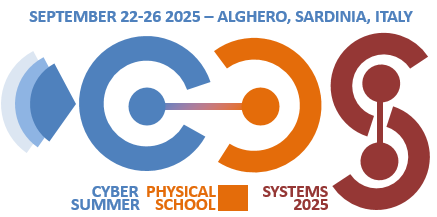Multi-objective Methodologies and Tools for Self-healing and Adaptive Systems
September 25-29, 2017
Porto Conte Ricerche, Alghero (Italy)
Cyber-physical systems are complex and autonomous ensembles of different components that directly cooperate to offer smart and adaptive functionalities. They are composed of sensors, actuators, and processing components that are deeply entangled: they constantly exchange information and actively interact with the external environment. So they are increasingly used in a variety of applications with a growing market. CPSs will potentially bring about significant social benefits; nevertheless, there is no such thing as a free lunch and several new challenges and trade-offs must be faced in their design, especially when the CPS should adapt to the changing environment or heal itself. Indeed, different nodes could cooperate to enrich the offered functionality. All the components are typically characterized by different spatial and temporal scales, while multiple and distinct behavioural modalities and contexts should normally be taken into consideration. In addition, uncertain operation environments and interactions with humans as users and/or as operators complicate the scenarios of these ever increasingly pervasive systems. Anyway, the Human Factor is not to be considered a constraint, but an opportunity for creating more useful and robust CPSs. An important effort has to be done in avoiding to privilege technology respect to users/operators needs and on the contrary in designing CPS systems to potentiate human abilities during the interaction with them, instead of doing a technology push. The CPS summer school is targeted at students, research scientists, and R&D experts from academia and industry, who want to learn about CPS engineering and applications. The program will cover all the design phases of CPSs, starting from the conception of the idea down to the definition of the final system and will discuss the key challenges (including adaptivity support, modelling and security) presenting state-of-the-art tools and methods and allowing participants to play with industrial and academic design environments.
Topics of interest include, but are not limited to, the following:
- Market trends for CPS
- Applications of CPS, including wearable, biomedical, Industry 4.0, cognitive, and automotive systems
- Hardware/software and multi-view modelling
- Adaptivity
- Low power design of heterogeneous systems
- Tools for dataflow design, high-level synthesis, hardware/software co-design, and coarse/fine reconfiguration
- Security in adaptive and interconnected systems
Important Dates:
Registration Closes by: June 20th, 2017 (EXTENDED) to July 7th, 2017
Notification of Acceptance by: June 25th, 2017 July 12th, 2017
*The Summer School has been partially funded by Sardegna Ricerche and Regione Autonoma della Sardegna.

